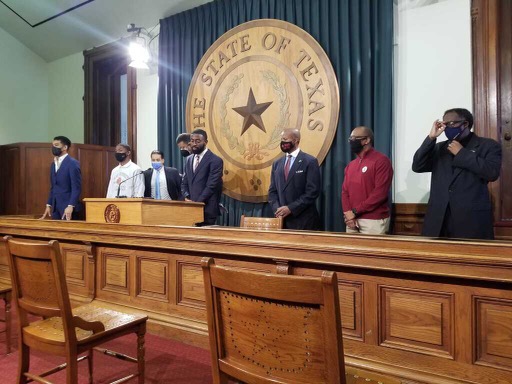State leaders join UT-Austin students to denounce continued use of “The Eyes of Texas”

March 29, 2021
Members of the Texas Legislative Black Caucus and the Texas chapter of the NAACP gathered at the Texas State Capitol to oppose the University’s continued use of alma mater “The Eyes of Texas” at a press conference Monday afternoon.
The conference featured multiple students, Rep. Ron Reynolds (D-27), Gary Bledsoe, president of the Texas State NAACP Conference, UT history professor Alberto Martínez and others.
“We oppose the decision by the President of the University of Texas to keep the ‘The Eyes of Texas’ as its official song, despite the song’s racist origins and history — and its humiliating impact on African Americans,” Bledsoe said.
UT President Jay Hartzell has said since July the song will remain after students and athletes called for the alma mater to be dropped. Hartzell created a committee of 25 people to research the song, and the group released a report on March 9 that said the song debuted at a minstrel show but was not “overtly racist.” Martínez released his own report on Wednesday with evidence of the song’s racist origins, including that the song’s title and phrase were inspired by Confederate general Robert E. Lee, which “The Eyes of Texas” History Committee disputed.
Reynolds, vice chair of the Texas Legislative Black Caucus, said the caucus has been in conversation with Hartzell about their stance against the song’s continued use.
Reynolds said the caucus made a “firm commitment” against the use of the song, and he hopes Hartzell will reconsider keeping it since Martínez’s report has published.
“I hope that the University of Texas will want to be on the right side of history, will want to continue to work with the students, continue to work with the Texas State NAACP, continue to work with the Texas Legislative Black Caucus, so we can make sure that we create a great environment that is welcoming for all students, particularly those that have historically been left out — African American students,” Reynolds said.
Reynolds said he spoke with Hartzell since Martínez released his report, but Hartzell told him the University was still “vetting” Martínez’s report. He said Hartzell was “patient” with him and seemed “concerned” after the report published last week. The caucus will meet again with Hartzell on Monday night, Reynolds said.
“We hope they’ll reconsider and continue to incorporate the demands the students have made,” Reynolds said. “The demands are reasonable. They’re not optimistic.”
UT spokesperson J.B. Bird said the University’s “previous comments on the status of the song stand,” when asked if Hartzell was reconsidering replacing the song.
Bird said the University is looking forward to working with state representatives, students and other stakeholders to “continue to improve our campus.”
“The university is committed to seeing through the initiatives started last summer and to looking for more ways to support our students,” Bird said in an email.
Zion James, an African and African Diaspora Studies and sociology sophomore and parliamentarian for the Black Student Alliance, said he denounces the use of the song. Though he does not hold a position on UT’s Black President’s Leadership Council, James called for UT to implement the council’s demands, which include more scholarships for Black students, increased recruitment of Black students and changing the names of all UT buildings named after people with a racist past, such as T.S. Painter Hall and the Belo Center for New Media.
The University changed the name of the Robert Lee Moore Hall building last summer to the Physics, Math and Astronomy building after students called for it, along with other buildings named after racist people, to be renamed.
Judson Hayden, a communications and leadership junior, said as a Longhorn Band member who protested the song, he received threats on social media and was offered no protection by the University.
“The University had a narrative, then took all the evidence (from the committee report) to confirm that narrative,” Hayden said.
People have been advocating against the song’s use for decades and have been ignored, Martínez said.
“I’m glad to have contributed in clarifying why this song is so offensive,” Martinez said. “Now, I’m not clarifying for African Americans or people of color, they already know … I’m clarifying for the white people who insist on being comfortably, blissfully (ignorant) to this.”
He said the University “does not have a democracy” and that there was no poll of faculty, athletes, students or band members on whether the song should stay, despite both legislative student bodies and hundreds of student organizations protesting the song last summer.
“We talk about change, ‘What starts here changes the world,’” Martínez said. “How about we change at UT? Why is UT so slow to change? … To UT-Austin, this is not going to get any prettier, this is not going to get any more comfortable, and we’re not going away.”
Editor’s Note: This story has been updated to include information from UT spokesperson J.B. Bird.


